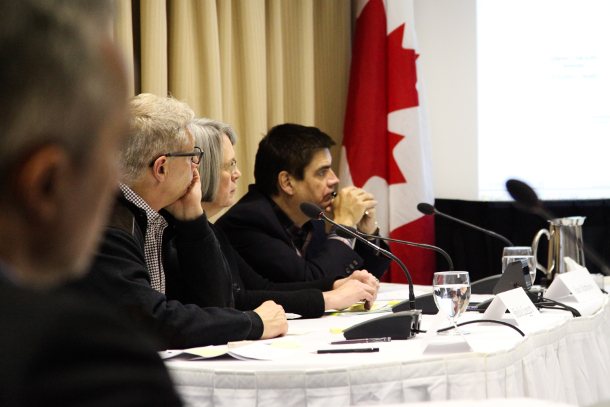As Kinder Morgan's oilsands pipeline expansion lumbers towards public hearings, the National Energy Board's announcement yesterday of who can participate, and how, is stirring debate in the province.
Four hundred applicants, including the cities of Vancouver, Burnaby and New Westminster, were granted intervenor status, allowing them to directly question the proponent and submit expert testimony and evidence when hearings begin in Jan. 2015.
Of more than 2,000 applicants seeking to weigh in, 468 were outrightly rejected. Four hundred and fifty-two were told they could write a single letter as "commenters," but didn't qualify for intervenor status.
Prominent pipeline-supporting B.C. Chamber of Commerce applied to be an intervenor but was granted commenter status, according to its NEB application obtained by The Tyee -- and despite its CEO's assertion the business umbrella group had only wanted commenter status in the first place. The organization has been a vocal supporter of both Kinder Morgan and Enbridge, but president and CEO John Winters said he was "absolutely happy" to be a commenter and submit a letter for consideration.
"We're not experts on the file," he said in a phone interview. "It's more than appropriate for an organization that operates on the level we do."
Kinder Morgan's proposal, the TransMountain Pipeline Expansion Project, would nearly triple the flow of diluted bitumen from Alberta's oilsands to the B.C. coast. Tankers from its Burnaby terminal would ramp up from 32 to 408 every year.
Winters argued that business support for TransMountain is simply a "no-brainer," because Canada is losing "$50 million a day in terms of the lost opportunity costs of selling our oil."
Tanker spike could impact Vancouver's 'brand': realtor
But some in the private sector are expressing concerns. One business coalition, Conversations for Responsible Economic Development (CRED), was told it could comment but not intervene.
"There was no rationale given, nor is there any appeals process," said executive director Liz McDowell. "A few businesses were accepted, but it's not always clear what the reasoning was... We've been doing quite a bit of research in the past year into the economic impacts of this expansion. We hoped to bring in an expert researcher on the impact of oil spills on real estate values, for example."
One of CRED's advisors is Vancouver realtor Noam Dolgin, who was himself accepted as intervenor.
"When I talk to my buyers, they would not want to buy a property near a pipeline. That is a prevailing opinion," he said. "Decreased property values can be a problem for owners, but it can also change the feeling of a neighbourhood and the social demographic of a community. You don't need a spill for decreased property values. It's basic supply and demand: you're eliminating demand just because of the perceived risk and threats."
Some of the economic risks, however, may not be even related to accident risks, according to some businesses.
"Of course the biggest risk we're exposed to is from a spill," McDowell said. "But if tanker traffic increases five-fold and Vancouver becomes known as an oil port, there's a risk that will impact our brand, and the livability of the region. That needs to be researched and discussed."
Winters questioned why any business would oppose the pipeline, and said he hadn't met any yet. "I don't know what the downside would be," he said. "The economic model is really unassailable."
Winters called the NEB's hearing process "tremendous" and applauded federal changes that limit the number of intervenors.
"This process now seems to be a lot more focused on getting to a goal, and coming to a decision," he said. "If [NEB's] Northern Gateway's process was any indication, it certainly wasted a lot of people's time in terms of the repetitive nature of testimony that, at the end of the day, had no real bearing on the decision."
Rejections mean thousands of voices 'denigrated': enviros
Many advocacy organizations decried the application process, even those who were granted full intervenor status, such as the Georgia Strait Alliance. The environmental organization's executive director expressed concern about the many groups and individuals either shut out or limited to writing a letter as commenters.
"It seems that since this process started, it's been about allowing as few voices to be heard as possible," said Christianne Wilhelmson. "To have so many of them told their voice doesn't matter... that's almost 1,000 people who applied whose opinion was denigrated. It's so against what we in Canada would expect for a project that could have devastating local impacts and national climate impacts."
Wilhelmson pointed to last year's changes to federal laws governing NEB hearings, which limited applicants to those who could prove they'd be directly impacted by a project.
"What we feared is coming true, that the reason the law was changed was because communities rose up and said they were concerned about Enbridge and didn't want its pipeline," she said. "That's not what the government wanted to hear, so they changed the law.
"The process has been designed to have as few people as possible take part. The NEB said they'll assess whether this project is in the best interests of Canada. But every single Canadian should have a right to say, 'This could impact me.'" ![]()
Read more: Energy, Environment















Tyee Commenting Guidelines
Comments that violate guidelines risk being deleted, and violations may result in a temporary or permanent user ban. Maintain the spirit of good conversation to stay in the discussion.
*Please note The Tyee is not a forum for spreading misinformation about COVID-19, denying its existence or minimizing its risk to public health.
Do:
Do not: